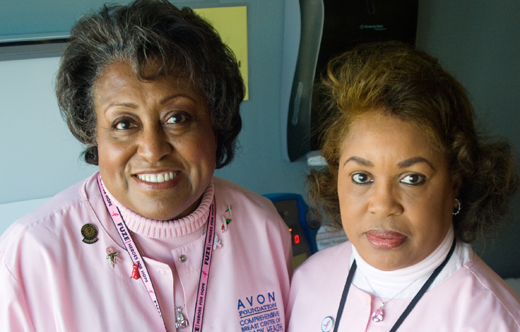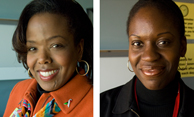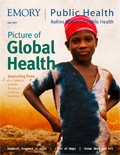The pink ladies at Grady

Dorothy McMichael (left) and Gloria Brown help breast cancer patients stay in treatment at Grady Memorial Hospital.
By Pam Auchmutey
Through gentle persuasion, patient navigators ensure that breast cancer patients stay in treatment.
The waiting room of the Avon Foundation Comprehensive Breast Center at Grady Memorial Hospital is crowded with a small sea of women.Whatever their state of health, they are where they need to be for screening or treatment for breast cancer.
|
Focus on cancer |
That’s no small feat, given the obstacles that many underserved women face. Too often, their health takes a backseat to worries about money, jobs, child care, transportation, and even homelessness. The pink ladies at Grady are there to help.
Named for the colorful smocks they wear, the pink ladies "are the glue that keeps patients in treatment," says Winifred Wilkins Thompson, research assistant professor of behavioral sciences and health education at the RSPH. The women serve as patient navigators (PNs) to provide information, emotional support, and needed referrals for women with breast cancer.
Trained by Thompson and others, the PNs are an integral part of the Avon Foundation Community Education and Outreach Initiative. Together, the initiative’s partners—the Avon Foundation, the Georgia Cancer Coalition, the Emory Winship Cancer Institute, the Grady Health System, and the RSPH—strive to teach underserved minority women about breast health.
"These are women who otherwise may not know they have cancer or who learn of it late, when the prognosis is bad," says behavioral sciences and health education associate professor Kimberly Jacob Arriola, who leads the initiative. "That’s why education by our community patient navigators [CPNs] is so important. Their message: The earlier you find out about your cancer, the better your prognosis."
CPNs and PNs play different roles at Grady, Atlanta’s public hospital with a longtime connection to Emory. CPNs educate women about breast health through exhibits and presentations at churches, community centers, senior citizen centers, and health clinics in Fulton and DeKalb counties. All are required to have at least five women fill out a mammography or diagnostic screening interest form. The forms enable CPNs and RSPH researchers to follow up with the women to ensure that they are screened for cancer. "Our goal is to get age-appropriate women to complete a mammogram, preferably at Grady," says Arriola.
Response to the forms has been positive. From August through December last year, 188 women filled them out. "Our CPNs are amazing," says Arriola. "They are there to help women with barriers to getting mammograms. We explain that they can’t afford NOT to make breast screening a priority."
 |
Kimberly Jacob Arriola (right), leads the community education and outreach initiative. |
|||
Gentle encouragement
Every Wednesday, CPN Gloria Brown talks to women about breast health at the Asa G. Yancey Sr. MD Health Center. Brown also happens to be one of Grady’s pink ladies. Like all Grady PNs, she is a breast cancer survivor.
When a patient in the Avon breast center at Grady receives a cancer diagnosis, the PN is there for support when the physician breaks the news. "We’re living witnesses that there is life after breast cancer," says Brown.
Once a patient is diagnosed with cancer, Brown stays in touch by phone, reminding her and meeting her at doctor appointments, helping her navigate through the Grady health system, and guiding her to resources for transportation and child care. All are vital steps to ensure that patients complete their cancer treatment.
Like their patients, PNs face their share of obstacles. Religious, cultural, and family differences can affect how patients view their cancer diagnosis.
"Some patients don’t tell their families they have cancer," says Dorothy McMichael, a PN who works at Grady the same day as Brown. "We try to help patients overcome that."
While receiving a breast cancer diagnosis can be frightening, learning the extent of treatment required—which may include surgery, chemotherapy, radiation, and hormonal therapy—can be overwhelming. Thompson observed that patients requiring multimodal therapy, i.e., three or more types of treatment, were most at need for patient navigation. Supported by a grant from the Susan G. Komen for the Cure Greater Atlanta Affiliate, Thompson expanded PN services to include home visits, support groups, and small patient incentives. For the past year, six of the 17 Grady PNs worked with multimodal patients to provide an extra layer of support to enhance treatment adherence rates at Grady.
Thompson is now evaluating data on the 34 patients aided by the Komen PNs. "We hope to find that patients were adherent to treatment and what made them adherent were the additional services offered," she says.
Arriola is encouraged by the results of a qualitative analysis of Avon patient navigation conducted by Dara Ford, 08MPH, who interviewed patients to determine the program’s benefits. Ford’s results will be published in an upcoming issue of the Journal of Cancer Education.
"It’s a powerful study because so little is known about why patient navigation is effective," says Arriola.
The Avon Foundation supports a number of PN programs for breast cancer patients nationwide. Programs are based on the work of Harold Freeman, a Harlem physician who developed the PN concept for cancer patients in the early 1990s. Several models are now in use.
Arriola believes the PN program at Grady stands out. Ford’s data "suggests that having breast cancer survivors as proof of life after cancer and providing phone support whenever they need it—that can make a huge difference in our patients’ lives."


